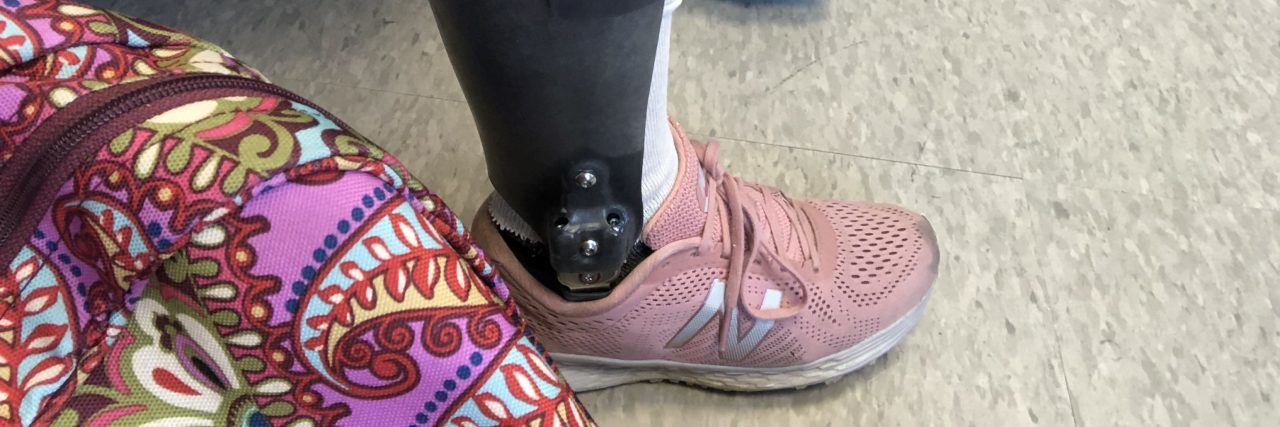I didn’t think internalized ableism applied to me. Perhaps part of me wanted to believe I was invincible to these types of forces. Everyone’s always telling me how strong I am, and giving me gold stars for getting out of bed that day; I couldn’t possibly internalize these things. Yet, here I am writing this, because today, for the first time, I recognized how deeply ingrained and internalized ableism is within me.
Ever since I started to publicly acknowledge my disabilities, I’ve been recognized on my college campus as the girl who is unapologetically disabled, willing to stand up for whoever the hell needs it, and always wants to go and do things that are bigger than myself, like change the way the institution handles disabled students and accommodations. It’s been years in the making, with lots of tedious meetings and arguments, but I like to think we’ve made some progress.
Anyway, the readings for that day’s class consisted of first-generation students with disabilities and transgender students with disabilities attending higher education, and I was so thrilled to read this literature! I have never before had a professor assign readings that addressed these minority groups in combination, let alone have an honest conversation about it in class and how it pertains to our institution specifically. But one comment just set me off.
I remember being triggered and don’t remember the specifics, but I think it was a comment about how the Student Accessibility Services used to be located in an inaccessible building, and people with physical limitations or disabilities could not use it (it has since changed). Then, the comment about how a specific building on campus doesn’t even have an elevator, and has a minimum of three floors. And it wasn’t just a building, but the building where most of my professors reside — pre-COVID — the sociology and anthropology building. And that building, located on the complete opposite side of campus, a hike in and of itself, sent my mind to a darker place.
Every experience I have had on this campus with my disability came rushing to my mind. I felt my cheeks getting hot, and the feeling of tears welling up in my eyes made me mad. Why was I so frustrated by this mundane building?
Here’s the thing. It wasn’t just that building. It was the memories of falling down flights of stairs and being covered in bruises because I attempted to climb the stairs despite knowing my body was telling me no. It was being harassed for wearing my AFOs (Ankle/Foot Orthotics), and being asked what was wrong with me. Or, the tics I had in class that caused people to move away from me, as if my being there was inconvenient to them. Being gaslit by a medical professional at the wellness center, and him throwing one of my medicines in the garbage. Professors refusing to accommodate me, and when they finally were willing to meet me in an accessible building, choosing a public space that allowed others to hear every single word of our detailed conversation. One professor telling my class that people with disabilities would be better off if they didn’t exist. And I could go on. And on. And on. But I think you get the idea.
I thought these events would just happen and I would feel upset. I would cry, feel discouraged, be covered in bruises, but get back up in a few days to a week like it didn’t happen. I was stronger now that I was in college — I had grown a thicker skin, as my dad would say. But for some reason, it all hit me like a train that day. I strayed from harder classes because I was told it was too complicated or hard for someone with my disabilities. That somehow I wasn’t capable of defying “the odds” and actually succeeding.
I don’t remember what I said, but I remember the intensity of the feelings. And then, I remember feeling embarrassed for the intensity of which I felt my emotions, and needing to apologize for feeling them. To thank people for tolerating my dramatic antics. But it’s not just me. In fact, it’s not me at all. Just today, I realized that ableism has penetrated my “can do it all” attitude. And so, here I sit, trying to acknowledge and even validate the intensity of my experiences and that they were not my fault, and the events that inevitably are going to happen in the future are also not my fault.
I am starting to realize that when I get a 97 on an assignment, I can be proud of that. I didn’t need a 100 to be happy. Let’s face it, I wouldn’t have been happy with a 100 either — somehow, I can still do better. But at some point, I need to show myself some grace and some compassion. The people who have aided my journey in internalizing my ableism are not in my physical presence anymore, and I am safe. I can stop doing work for one hour. I can watch a movie and lay in bed, and not be productive. I can request what I need and not need to apologize for it.
As unapologetically disabled as I am, and as much as an advocate I am for other people, I need to take a break from always putting others first. I need to put myself first. I need to advocate for myself. After a seven-hour day on Zoom, and then forcing myself to get ahead on work for a week from now, I can just exist. And be happy with my being.

